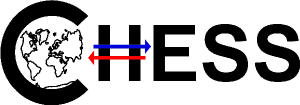
Group photo of all the course participants and lecturers, including our watch leaders on the ship. Photo: Jesper Rosenmai
In the month of November 2021 around 30 students and lecturers attended the ACDC/CHESS One Ocean field course in the Caribbean onboard the tall ship Statsraad Lehmkuhl. Our voyage started in Curaçao with a stop in Jamaica and ended in Cuba. A highly interdisciplinary group of participants from around the world, including Canada, Jamaica, the USA, and Norway was brought together. The course focused on the causes, consequences, and solutions to climate change. As a part of the One Ocean expedition, it wanted to create attention and share knowledge about the crucial role of the ocean for sustainable development.
The course started in September with weekly lectures on zoom from invited speakers, followed by group work to develop research and outreach projects. Topics included coastal flooding and sea-level extremes, climatology of hurricanes, marine resources, and historical ocean data with a focus on the iconic HMS Challenger expedition. Emphasis was put on understanding the causes and consequences of climate change for Caribbean Island communities.
On the ship, we were sailing trainees and took part in the daily routines of the crew. While on watch we had four mandatory posts – lookout, manning the helm, fire watch, and buoy watch (also known as man overboard watch). When not on these posts, we learned about sailing, climbed the rigging, polished brass, or pulled ropes until we got blisters (while singing shanties of course). The heat was at times exhausting and the days were fully packed with activities, but we got used to the sailor lifestyle and jumping out of our hammocks to muster in military-style on deck every morning quickly felt normal.
Photo left by Aurora Høines Baardsen: We walked the plank and had a refreshing dip in the ocean.
Photo right by Sunniva Rutledal: Discussing the hemp rope measurements.
When not on sailing duty we had lectures or worked on our group projects. It was amazing to discuss climate science with fellow students and learn from the great researchers on board. We also did field measurements, one being the deployment of a hemp rope with modern instruments attached to measure ocean depth and temperature, inspired by the HMS Challenger expedition. A lot of time was spent splicing rope and figuring out the most efficient way to lower, hoist and store the rope.
Outreach was also a big part of the course and all groups prepared workstations with hands-on activities in Kingston and Havana, where local schools were invited to the ship to learn about climate science. We also participated in a knowledge exchange workshop at the University of West Indies in Kingston and ended the course on November 26th by attending a seminar at Hotel Nacional in Havana, where we presented the findings of our group projects.
After successfully completing the course, we went out to enjoy the vibrant city of Havana with a bag filled with new knowledge in one hand, and a Cuban cigar in the other. A big thank you to the organizers and participants for this once-in-a-lifetime field course!
Text: Marit Holten Løland


